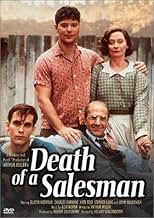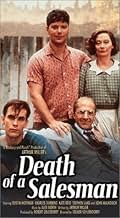This making of documentary, focusing on the set, as opposed to post-production of Volker Schlondorff's TVM adaptation of the Broadway stage version of Arthur Miller's Death of a Salesman, raises some interesting questions.
Are making of documentary's to be used as marketing ploys to publicise product, or do they exist as historical documentation? And when should be they viewed - during or after the production is complete?
Having watched this documentary after seeing the TVM was a different experience to seeing it before, and I wondered if my negative response to the documentary would be so heightened. As I saw it, Private Conversations is rambling self-indulgence and counter-productive to the intention of publicising the TVM. There are few interviews - only by Hoffman and Arthur Miller to-camera. Otherwise, we view rehearsals, alternate takes, goofs, and rushes screenings during production.
The only interest comes from director Christian Blackwood's use of the model set as context for the scenes we see being filmed, the silhouette way Hoffman is presented, and his directing takes with Schlondorff's permission after suffering from his "green knot" in the stomach which is his sign that the work is sub-standard. We see Hoffman and John Malkovich without character make-up, and Tony Randall and Warren Beatty visiting the set.
Hoffman confides that his empathy with the part of Willy Loman comes from the parallel with his family, where his father was also a salesman, and Miller attests that Hoffman is the perfect and first physical embodiment of how he envisaged the part, though Hoffman is, at the time, 15 years younger than the 60 year old Loman.










